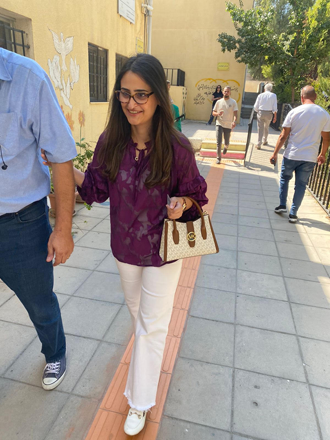AMMAN — While the Independent Election Commission (IEC) confirmed it had equipped polling centres to be accessible to persons with disabilities, some complained of difficulties they faced while casting their ballots, mainly related to etiquette.
However, some other people with disabilities commended the preparations put in place by IEC, expressing joy for being able to participate in the elections.
Interviewed by The Jordan Times at a polling centre at the Queen Rania Al Abdullah Comprehensive Secondary School for Girls in Amman, IEC Head of Civil Society Department Qais Irshaidat said that the commission, in cooperation with partners, had prepared special voting centres for persons with disabilities.
"The [voting] process in many centres went smoothly," Irshaidat added, noting that the commission received critical remarks at some centres and resolved what it could.
The centre, located in Amman's Abdoun neighbourhood, was observed to be prepared to accommodate voters with disabilities, demonstrating accessible pathways, ramps, and other necessary adaptations such as an indoor tactile paving.
However, a voter on a wheelchair, who preferred to remain anonymous, said, “The polling station was on the second floor, which I couldn't access."
She was offered to be carried to the second floor to cast her ballot, and said: "I wasn't comfortable with being carried there.”
Compared with her previous voting experience, she praised the newly installed ramps and the ease of accessing the building, noting that parking was allowed right at the entrance.
Ebaa Hamed, who has low vision, reported a successful voting experience overall, thanks to her assistant who helped her reach the polling station.
Yet, Hamed highlighted a point of concern regarding etiquette when interacting with people with disabilities. She said that while head of the committee was very informative, he directed his comments towards her assistant rather than addressing her directly.
Another successful voting experience was reported by Khaled Nabulsi, who has amyotrophic lateral sclerosis (ALS). He was able to vote without issues because his polling station was located on the ground floor.
"I had a very positive experience voting today," Nabulsi said.
He referred to the hard work, and good planning and preparation.
"For me, it was a success, but I hear, it may not have been the same for all. Nonetheless, the election committee was eager to assist me and others to provide every possible accommodation. Lessons are learnt, we are an evolving democracy," he noted.
Nabulsi said that voting is the greatest right under the Constitution, adding: "I believe if you don't vote, you shouldn't criticise; the fact that I am a person of physical disability didn't matter today."
He also expressed appreciation for the IEC and the Higher Council for the Rights of Persons with Disabilities for their efforts.
During the coverage, there were no volunteers designated to assist persons with disabilities, only general help volunteers. Additionally, the roll-up banners indicating that assistance was available were placed inside the building rather than at the entrance.

